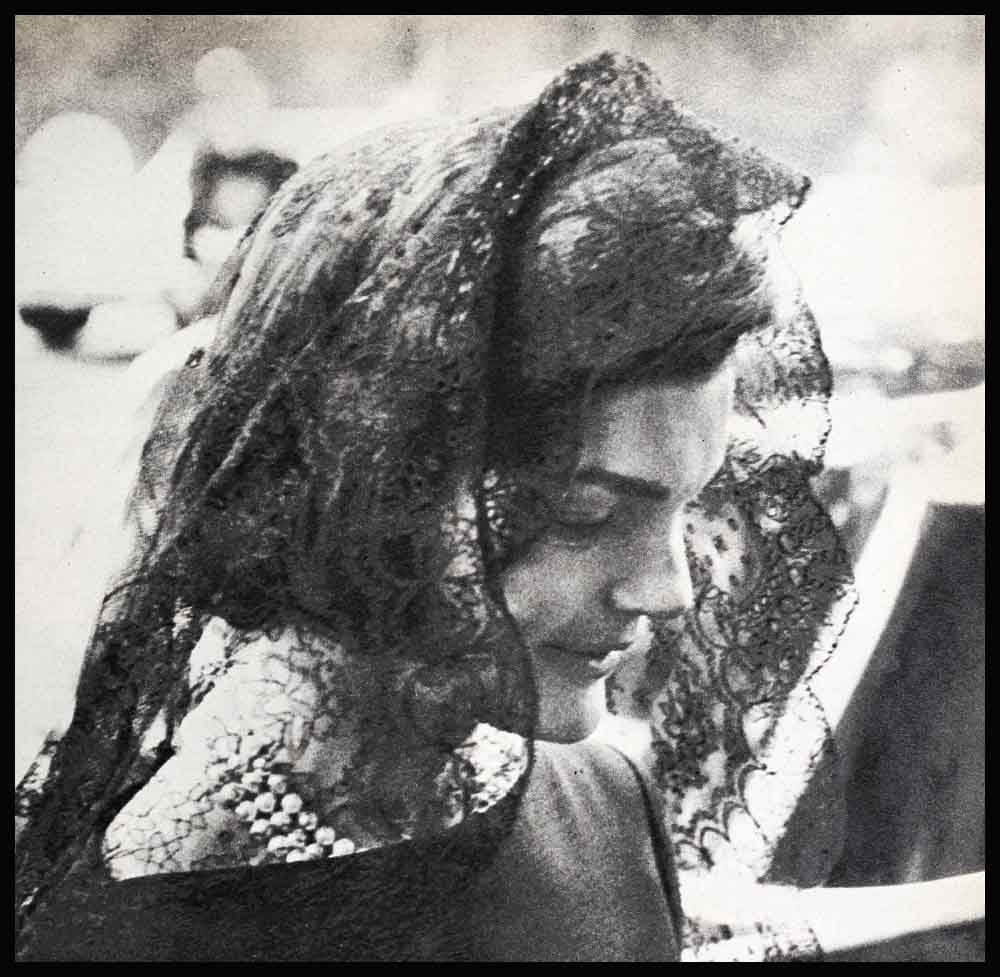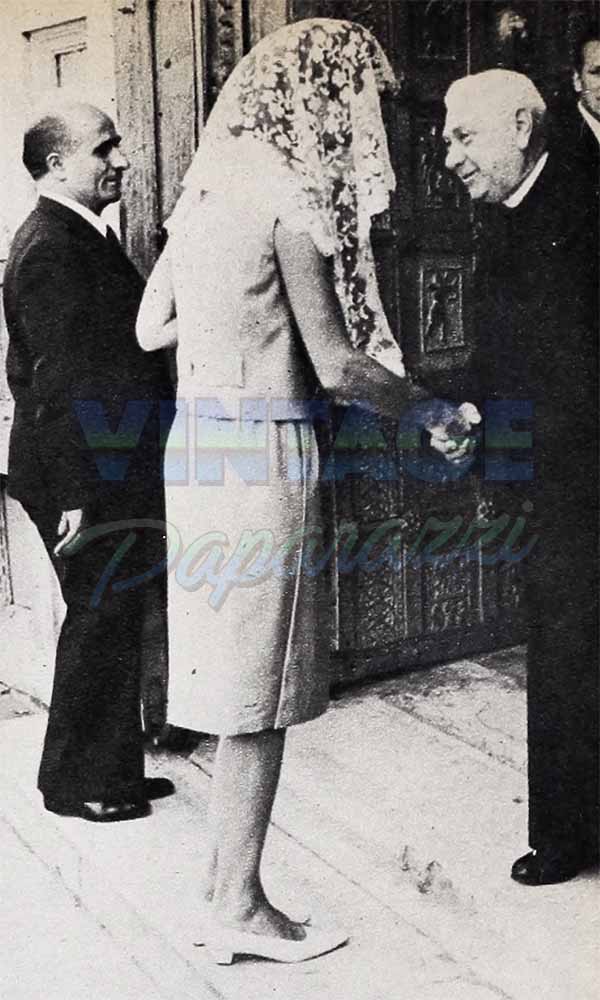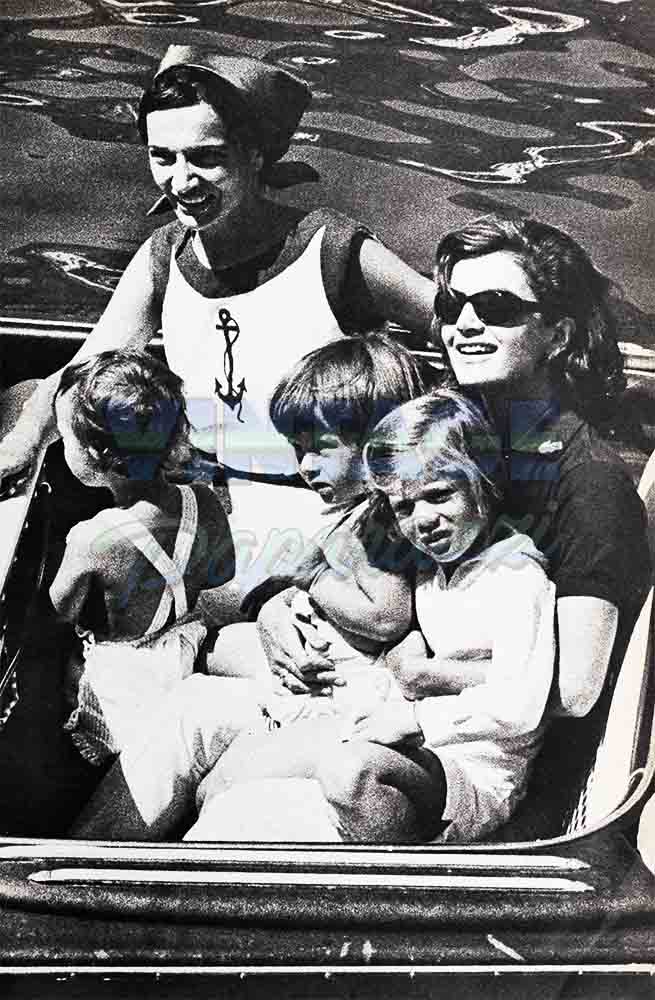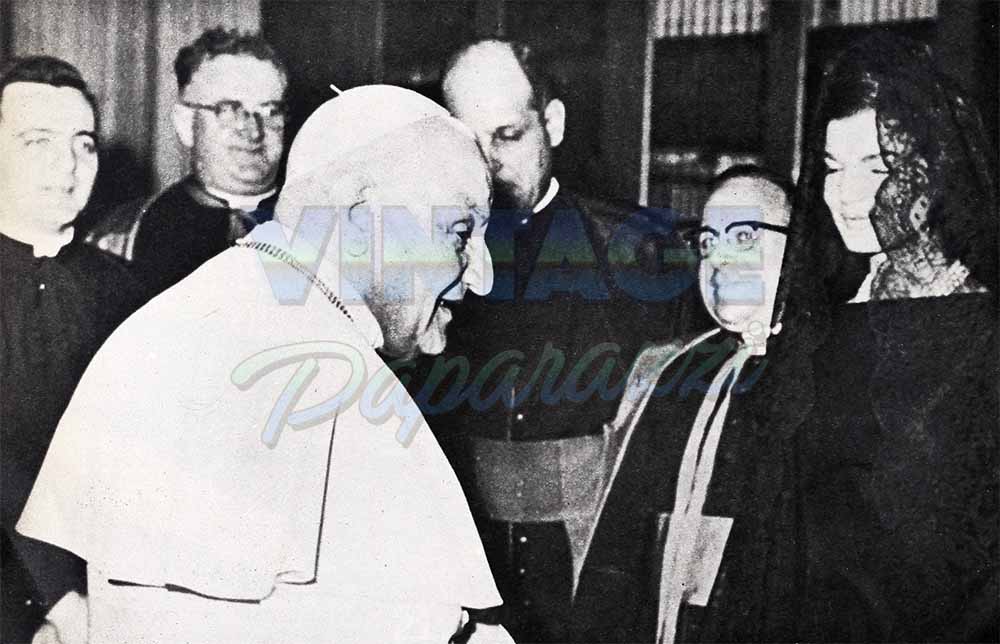
Jackie And The Church
To a nation peeking in on Jacqueline Kennedy’s Italian “vacation” trip last August, it seemed like all ice-cream cones and pedal pushers and a gorgeous suntan and water- skiing over the blue Mediterranean by day and espresso- sipping with friends in out-of-the-way cafes by moonlight. Just a big happy summer festa—it seemed. But rumors had started making the rounds even before Jackie left Washington; that the true purpose of the trip was her desire to help clear up with the Vatican the question of her sister Lee’s first marriage, so that Lee and her present husband, Prince Stanislaus Radziwill, could be married in a Roman Catholic ceremony. And that Lee was terribly unhappy, sometimes despondent, because her soul was not considered in a State of Grace by her church; that her predicament might well be an embarrassment to her brother-in-law. the President of the United States, and consequently, one of the world’s leading Catholics; that her children might one day suffer socially from the stigma of her predicament—since the church considered her invalidly wed; that she could no longer fully partake of the religion she knew and loved.
Towards the end of Jackie’s Italian trip, suddenly, the crux of the rumors got into print.
“Lee Radziwill has been married and divorced once,” a newspaper article stated. “Prince Radziwill. a descendant of Polish kings, was married and divorced twice before marrying Lee in March, 1959, at Fairfax, Va. Both are Catholics. . . . Mrs. Kennedy is trying to have the previous marriages annulled so the Church can officially recognize the Radziwills’ marriage. Since the Church forbids divorce, the marriage is considered nonexistent.
. . . Mrs. Kennedy is forced to cloak her true mission in secrecy, because she can not appear to be asking for favors from the Vatican that would he denied to the average Catholic. . . . Her emissary to the Vatican is an important lay member of the Church and a Knight of Malta, one of the highest lay titles bestowed by the Vatican.”
Who printed the rumor?
The New York Post. Significantly, the Post—since this is one of the few pro- Kennedy newspapers in the U.S. Since it is certainly read at the White House. Since—unlike many other newspapers in the country—it ordinarily goes out of its way not to print anything that might hurt or embarrass the First Family. And—since its editors have exceptionally good access to knowledgeable sources.
Was the Post story true?
It certainly made sense.
The sisters were close
Jackie and Lee, after all, had grown up together. Their closeness was, and is, incontestable. As children, though their temperaments were different, they were constantly with one another. Lee, it has been said, forever followed her independent and more spunky older sister around the way a happy puppy dog follows its mistress. As teenagers the togetherness continued. Lee’s biggest thrill, at age sixteen, was when Jackie asked her to come along on a two-months’ motor tour of Europe (several other girls on the tour. with younger sisters of their own. thought Jackie was “absolutely drippy” for doing so).
Today, as adults, the closeness and love between the sisters remains stronger than ever. As witness this recent remark of Jackie’s to a friend: “Lee is marvelous. I am so proud of her—and we always have such fun laughing about little things when we are together. Nothing could ever come between us.” And this: “I sometimes think that many of the pleasures of my life would have been missed if it hadn’t been for Lee. And had we not grown up together.”
Too, Jackie and Lee had grown up as Catholics together. Though their mother—now Mrs. Janet Lee Auchincloss—was an Episcopalian, their father—John Vernou Bouvier—was a Catholic and a rather devout one. His two daughters were reared in his faith, both having been baptized in the Church of Saint Ignatius Loyola on New York’s Park Avenue, both having received their First Communion, both having been Confirmed. The story goes that one of the girls’ favorite pastimes with their dad was to have him sit and tell them family stories about their great-grandmother, Caroline Maslin Bouvier, a beautiful and generous woman who spent her time in good works and established the New York Foundling Hospital, an institution run by nuns, but where unwanted children are accepted regardless of race, color or creed.
The story also goes that both Jacqueline and Lee were exceptionally good church-and-Sunday-School-goers, and so it is not hard to imagine that first as children, then as adolescents, they were well instructed in the Sacraments of their church—and, among these, the Sacrament of Matrimony—a subject understandably dear and important to every young girl’s heart.
Nor is it hard to picture Jacqueline and Lee seated side by side of a Sunday morning, years ago (when they were old enough to understand the facts of life and of their religion) and listening to a good nun say to them, in kindly but in no uncertain terms:
“Matrimony, my children, is the Sacrament which unites a Christian man and woman in lawful marriage and by which they receive the grace to discharge their duties. God, infinitely wise, made marriage for the good of the man, the woman and their young ones; for the happiness and well-being of the family, the good of the State and the orderly conduct of the human race. Failure to observe God’s laws in marriage can only result in injury to all those He intended to benefit by His laws. Christ demanded two properties of every Christian marriage—unity and indissolubility. The Catholic Church holds, therefore. that a marriage which has been celebrated in proper form, which has been consummated, can be dissolved by no human authority whatsoever; therefore, re- marriage after a divorce is impossible. Impossible. Is that understood, my children? That, otherwise, one commits a mortal sin. That, otherwise, one is no longer in a State of Grace and can receive none of the other Sacraments of the church. Is that understood, my children?”
The two girls—Jacqueline and Lee—sat listening, and nodded yes.
And so, not too many years later, one of the sisters—Lee—who married in 1953, divorced in 1957 and remarried another man in 1959 committed, in the eyes of her church, a mortal sin.
To go back a bit: Lee’s marriage in April of ’53 was with Michael Temple Canfield, a publisher. Though Canfield was a Protestant, he obviously agreed to a Catholic ceremony, since the wedding was performed in the Holy Trinity Church of Washington, D.C., in “proper form”; that is, before a priest and with two witnesses. That Lee meant for her marriage to be lasting, there’s no doubt. But, it seems, things went wrong with the marriage almost from the beginning.
In a book by Mrs. Mini Rhea, a dressmaker to both Jacqueline and Lee and quite close to the girls ten-odd years ago, this statement appears, relating to the Jacqueline Bouvier-John Kennedy wedding, which took place in September of ’53: “Lee was there, and in fact, had come all the way from England, where she was now living with her husband, to be matron of honor. I remembered the two Bouvier girls as carefree young women coming in together to have playtime clothes made. How quickly life gives us cares and responsibilities, I thought. Now I heard that Lee did not like having to live so far from her family and friends and was quite miserable.”
Lee stuck her marriage out, however, hoping that things would begin to work out well for her and her husband. At one point—with the birth of a son, Anthony—things did seem to be working out. But then, suddenly, Lee and Canfield announced that they were divorcing. And that seemed to be that.
It’s important to note here that no sin was being committed by Lee in the eyes of the church at this time since divorce, as such—in Catholic thinking—has no effect before God. The sin was committed when, in 1959, Lee married Prince Radziwill. Here it mattered not a bit to the church that Radziwill was a kindly man. Or that he would be a good provider to Lee and to any children they might have (a daughter, Anna Christina, was born to them in 1960; President Kennedy, in fact, was the godfather). Or that he revered his wife. (Jackie once said about him, regarding the trip she and Lee made together to India and Pakistan earlier this year: “Stas was so good to let Lee come. You know, he really believes all women ought to be in purdah.”) In short, that he was a fine husband didn’t matter to the church at all. It couldn’t matter. “In the year 1012,” as one priest told us recently, “Christ raised marriage to the dignity of a Sacrament, and as such it must be respected by all.”
The priest went on to say, “I can certainly understand Mrs. Kennedy’s desire to help her sister in this matter. This is admirable. This is the way it should be between family members in times of crisis. But this particular crisis is Mrs. Radziwill’s alone. It seems from what you say that she indeed desires an annulment. Annulments are granted on various grounds—but usually it takes years before they are granted.
“What grounds? The proving of what are called diriment impediments. Frequently, impotence—antecedent and perpetual. Age—that is, a boy who has not completed his sixteenth year and a girl who has not completed her fourteenth year cannot validly marry. Frequently, consanguinity—marriage with a very close relative. And force and fear, of course— which is as it sounds, a marriage under duress. There are other impediments, several others. But whether an annulment is granted always depends upon the individual case—and, as I said, usually it takes years to prove the impediment and to gain the annulment. As I said, too. the problem here is Mrs. Radziwill’s alone. And the State of Mrs. Radziwill’s soul is better left between Mrs. Radziwill and God. It is a matter to be treated with reverence, with calm.”
The calm, however, was completely shattered once the Post article appeared. Reporters in Italy naturally got onto the story and asked press representatives of both Jackie and Lee for comments.
Neither of the sisters had any comment. But Eleanor Packard. Rome correspondent for the New York Daily News, quoted a source “close to the Vatican” on the grounds by which Lee hopes to get an annulment: “Lee, the source said. bases her plea on the ground that her first husband, American publisher Michael Canfield, had no intention of having children when he married her in a Catholic ceremony in Washington in 1953. The couple had a child, Anthony. 3. But since having children is regarded as primary aim of marriage by the Catholic Church, Canfield’s reported attitude could still be interpreted by the Rota (the Vatican’s highest tribunal on marriage matters) as a mental reservation that would constitute grounds for annulment, the source said.”
Jackie, her vacation ended, left Italy but the reporters persisted in tackling Lee alone now. Until finally her husband— realizing how upset his wife was becoming over the rumors. the counter-rumors, the hullabaloo being stirred up over this sacred matter—agreed to see several reporters and have a talk with them himself.
He started by saying that published reports that his sister-in-law Jacqueline had been negotiating secretly with the Vatican for an annulment of his and Lee’s previous marriages were “absolutely false” and “very distressing.”
“My wife asked for an annulment of her previous marriage four years ago.” he said. “Her case is now before the authorities in the Vatican. There is no problem with the church about my own previous marriages. My first marriage ended in divorce and was then annulled. My second marriage was a civil ceremony, which was not recognized by the church. In fact, when my second wife remarried it was in a Catholic ceremony, as the church considered her free to marry. I hope this clears the matter.”
Cleared, yes, but it did not end it.
For, obviously, Lee’s case was still before the Roman Rota. And—though it was encouraging to note that the Rota was considering the case—a final decision was still to be made.
It is with this in mind that we hope and pray sincerely that the Rota—should God so will it—eventually will grant the annulment.
For the sake of Lee Radziwill.
For the sake of her husband.
For the sake of the children involved.
And, parenthetically, though not unimportantly, for the sake of Jacqueline Kennedy who wants—like a good sister—nothing more than to see her sister happy.
It is a quote. PHOTOPLAY MAGAZINE JANUARY 1963








vorbelutrioperbir
16 Temmuz 2023Valuable info. Lucky me I discovered your web site by accident, and I am surprised why this accident did not came about in advance! I bookmarked it.